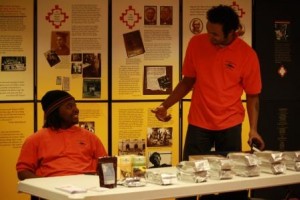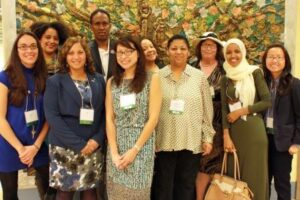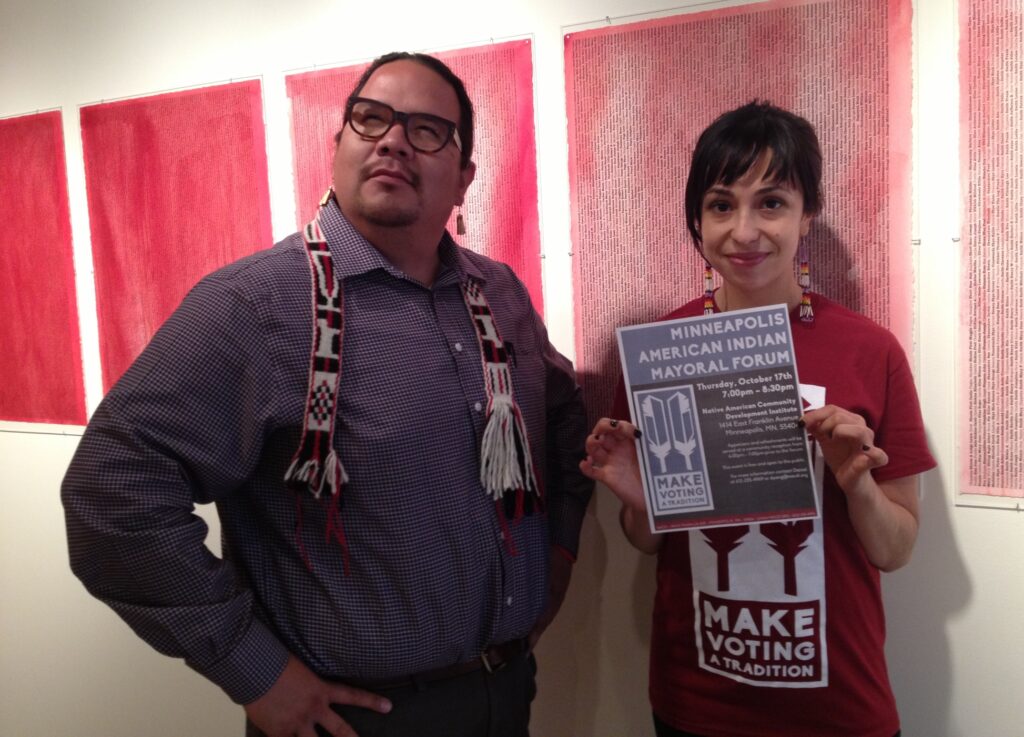On Thursday, January 9th, 2014, over 60 community members gathered at the Hallie Q. Brown Community Center in St. Paul to discuss the shifting demographics in Minnesota’s workforce. Together, attendees explored how local government, employers, and community members are ensuring that communities and leaders of color will capitalize on these demographic shifts in the Twin Cities.
Jane Tigan of Minnesota Compass – Wilder Research kicked off the event with a presentation of the data. In her PowerPoint (available here: Minnesota Compass Demographic Shifts Data), Tigan demonstrated three key shifts in Minnesota’s population:
1) Our population is aging, with retirement-age population soon exceeding the school-age population for the first time in Minnesota’s history;
2) Our population is rapidly diversifying racially and ethnically: nearly all of our population growth in the past 12 years has been in communities of color, where populations of color have increased 250% since 1990;
3) The workforce needs are heading toward more education requirements, with significantly higher demand in the STEM fields (Science, Technology, Engineering, Mathematics).
Listen to Tigan’s entire Shifting Demographics presentation below.
Jane Tigan
Research Associate
Minnesota Compass – Wilder Research
Following Tigan’s presentation, panelists Karen Francois (City of Minneapolis), Debbi Harris (The Arc Greater Twin Cities), and Chris Ferguson (Bywater Business Solutions) shared their reactions to the data, and – most importantly – how they are prioritizing these demographic shifts in their respective work as a policymaker, an advocate, and an employer.
Click on the links below to hear each speaker’s segment of the panel. Click here to view the photo gallery of the event.
Karen Francois
Director of Employment Equity
City of Minneapolis
“In August of 2012, the City of Minneapolis passed a resolution supporting employment equity …one of the things it did was it directed staff (staff in my division) to develop a racial equity toolkit and we’ve been working on that ever since [working closely with the City of Seattle’s Racial & Social Justice Initiative]…One of the things that I’m most proud of is our Urban Scholars Program, which is a leadership development summer internship program for college students from diverse racial and ethnic backgrounds to prepare them for positions of influence in the public sector…Mayor Rybak was so impressed with the program [and our results] in such a short time that he doubled our budget. And so we’re going to go forward with 35 urban scholars this summer [some placed in Minneapolis Public Schools, some at the Metropolitan Council]…We [City of Minneapolis staff] do not reflect the population…so we are preparing young people, young college students of color, for positions of leadership for a population (as Jane said) is going to be increasingly diverse.”
Karen Francois
Debbi Harris
Immediate Past President, Board of Directors
The Arc Greater Twin Cities
“Our son, Josh, has very complex medical needs…when you look at Josh, you know he has a disability; you know what his barriers are going to be…I think the first barrier was that the medical community would not accept him as worthy of treatment based upon his potential, or perceived lack of potential …There are a lot of our children and our children of color who a couple things happen: the first is that they might be pushed into receiving labels of disability when that is not the case; and secondly, those who do have disabilities that might have an impact on their potential employment or how their education is approached who aren’t getting those diagnoses early enough, who aren’t getting support early enough, and are not getting the advocacy that they need. That’s why I’m here …My message here is more so: I think we need to raise the question about how we value disability. When we look at the numbers of how many workers are available – those are typical workers without any compromises at all. So when you have a student or a young person who wants a job but maybe is on the Asperger’s spectrum, maybe has autism, maybe has an intellectual disability that affects speech or whatever – how do we receive those people? And how do we approach them?”
Debbi Harris
Chris Ferguson
President & CEO
Bywater Business Solutions
“How do we start thinking about creating jobs and attracting companies that fit the assets we have? [Businesses have] figured out very well how to make money…I do think that given the right opportunity, the right resources, the right champion, that we could encourage them to use that same brain power to be thinking: ‘How do we take the physical and human assets we have today [and create jobs for those specific human assets]?’ Some of those jobs might be great for people with disabilities; some of those jobs might be great for people that need a flexible work schedule. But if we think about that as we’re creating the business model, as opposed to trying to shoehorn those people into an existing business model…we might be more successful in thinking about how do we [both give] those people a greater opportunity to stay employed.”
Chris Ferguson
This event, Engaging for the Future: Demographic Shifts & the Call to Action, was part of Nexus’ Boards and Commissions Leadership Institute (BCLI) Thursday Night Issue Series, in partnership with Wilder Foundation’s Neighborhood Leadership Program (NLP) Link-up Sessions, part 2 of a 2-part series titled: Leadership in the Twin Cities: Our Networks. Our Future. The first event was held in November, emphasizing the importance of social capital, and capitalizing on each other’s networks to create opportunities for leaders of color in the Twin Cities.
Joining the event were two additional key partners:
1) Brotherhood Brew of Brotherhood, Inc., an innovative social enterprise that provides comprehensive coffee services to businesses, nonprofits, individuals and events in the Twin Cities. All proceeds from the sale of Brotherhood Brew allow Brotherhood, Inc. to provide participants employment opportunities and essential job skills.
2) Members and organizers of Discussions that Encounter: Race & Racism in American Society, a group of community members who hold discussion forums two Thursdays each month to explore the injustices in American society based upon the concept of race, and the resulting engagement of racism. View the Discussions Brochure to learn more about Discussions that Encounter.
For more information about the BCLI Thursday Night Issue Series, the BCLI, or any upcoming events, click here, or contact Ms. Angie Brown at abrown@nexuscp.org. For more information about NLP or NLP Link-up Sessions, contact Mr. Damon Shoholm at damon.shoholm@wilder.org.



